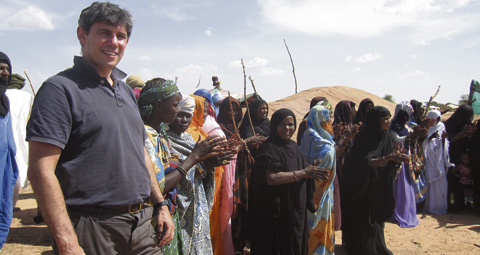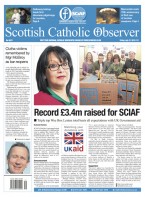January 30 | ![]() 0 COMMENTS
0 COMMENTS ![]() print
print

SCIAF’s five decades of Faith in action
SCIAF director ALISTAIR DUTTON reflects on the charity’s 50th anniversary— by looking at its work at home and abroad—while also explaining how the organisation continues to be guided by the Church’s teachings
With your support, we have achieved great things since SCIAF was founded in 1965. In God’s love, we have walked in solidarity with the poor and oppressed. Millions of people in Africa, Asia and Latin America have been given the tools they need to work their way out of poverty, and hundreds of thousands have received life-saving aid after disasters. In schools and parishes across Scotland we have helped generations of supporters to put their faith into action and reach out to those in need overseas. All this has only been possible thanks to your support.
However, our 50th anniversary is not a time for celebration. Widespread poverty and injustice remain hallmarks of our world and one in eight people still go hungry. Growing inequality, together with social and economic injustice around the world mean we must still help people in need and lobby those in power.
Despite the challenges that still lie ahead it is valuable to reflect on the good that we have done together, and how the Church’s teachings have guided our journey through the years.
A huge debt is owed to our founders and all those who have worked hard and supported us. Guided by the principles of the Second Vatican Council, Mgr John Rooney and John McKee set up SCIAF in a Rutherglen classroom with a budget of just £8000. The Bishops’ Conference of Scotland appointed Bishop Michael Foylan as our first Treasurer. Their aim—which we still follow today —was to help the world’s poor and inspire Scottish Catholics to respond to the Gospel call for a just world.
The words of Pope Paul VI, in his encyclical letter On the Development of Peoples, were the inspiration for the growth and development of SCIAF and many other Church aid agencies around the world. In the encyclical, Pope Paul VI wrote: “The hungry nations of the world cry out to the peoples blessed with abundance. And the Church, cut to the quick, asks each of us to hear the plea and respond lovingly.”
Our founders took this message seriously. Through their initiative and dedication Catholics up and down the country were able to respond to emergencies including the 1968 famine in Biafra (now part of south-eastern Nigeria, so desperately disturbed by the recent attacks of Boko Haram) and drought in Bihar in India. In 1970 we were able to send vaccines and medical supplies to help survivors of Cyclone Bhola in Bangladesh, in which some 500,000 people lost their lives. Our work continued through the decades, providing direct help to those in need overseas including Vietnamese refugees fleeing their country from the mid-1970s and Ethiopians hit by the terrible famine in the mid-1980s.
In line with the teachings of the Church, our work has not just focused on the financial support we give those in need. It is much more about justice and accompanying them on their journey ‘from less human to more human conditions,’ in the words of Pope Paul VI. This message was clearly captured by Canon Rooney, when back in 1971 he said that the money we give, ‘does not represent a charitable hand-out to soothe the consciences of Scottish Catholics, but is a genuine attempt, however small, to wipe out the glaring inequalities which exist in the world.’
As the official international aid charity of the Bishops’ Conference in Scotland, we hold true to the belief that development is about taking care of the whole person. Echoing the words of Pope Paul VI, Pope Emeritus Benedict XVI wrote in his encyclical letter, Love in Truth of 2009, that ‘authentic human development concerns the whole of the person in every single dimension.’
This is reflected in our work in a practical way. For example, after the Asian tsunami in 2004, we not only rebuilt homes and helped people to earn a living again, we also worked with children so they could overcome their fear of the sea, and learn to play in it once more. In both Sierra Leone and Liberia, where victims of Ebola are being buried in mass graves with special precautions, we’re helping their loved ones who are denied traditional funerals with emotional care and counselling so they can mourn and say goodbye in other ways.
Again reflecting the teachings of Popes Paul VI and Pope Emeritus Benedict XVI, our work over the years has helped people to take control of their lives—providing a hand up, not a hand out. This is why, for instance, we support many small savings groups among poor women, who use their collective funds to help each other. Loans are given to the women in most need, who might buy a sewing machine or a few goats to make a living for themselves and their children. We help poor farmers to grow more food so they can sell the surplus and pay for healthcare, education for the children and grow in dignity and self confidence.
The Church’s teachings also direct us to tackle the structural or root causes of poverty such as inequality, economic injustice and climate change. Poverty is not inevitable and we have an important role to play. As the Bishops of Scotland said in a pastoral letter to mark our 40th anniversary, poverty is often ‘caused and kept going by decisions taken by us or in our name.’
This has led us to play important roles in popular political campaigns over the years such as the Jubilee Debt campaign, Make Poverty History and most recently, Enough Food for Everyone IF. In various ways, these have made a huge difference, leading to the cancelation of debt for many poor countries, a massive increase in international aid, and help for people who are already being hit by the onset of climate change. Pope Emeritus Benedict XVI called this kind of response ‘the political path of charity, no less excellent and effective than the kind of charity which encounters the neighbour directly.’ Every Christian, he said, is called to practice this charity according to their role in society. We are one, global, human family and our lives are closely linked; decisions we make or which are made on our behalf affect our brothers and sisters throughout the world, and we have a grave responsibility to ensure that these decisions are made wisely and morally .
Pope Francis has been prolific in highlighting the plight of the poor and the need for social justice, calling for us to be ‘a poor Church for the poor.’ To mark the start of our anniversary this year we were honoured to receive a blessing from the Holy Father. In it, Pope Francis reiterated his Lenten message from 2014 in which he said,
“We Christians are called to confront the poverty of our brothers and sisters; to touch it, to make it our own and take practical steps to alleviate it… Our efforts are also directed to ending violations of human dignity, discrimination and abuse in the world, for these are so often the cause of destitution in the world.”
These words drive our work every day—they are the inspiration and life-blood that flows through SCIAF’s veins. Over the years, whether it has been responding to major disasters such as the Haiti earthquake and the war in Syria, helping people to free themselves of hunger and poverty, or campaigning for justice, we seek to reflect God’s love for his people.
With your support, over the last 50 years we’ve given millions of families a better chance in life and hope for the future. We won’t stop while they need our help.











